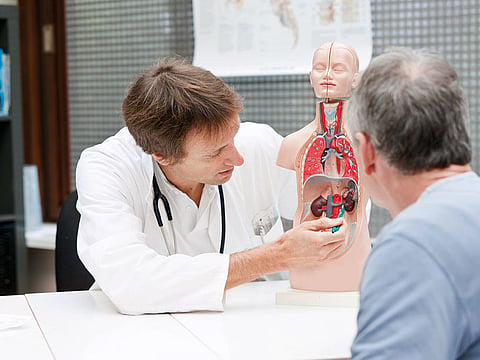Keep your kidneys healthy
About a third of diabetics develop renal complications. Saba Siddiqui tells you how to prevent them

According to research, diabetes is one of the leading causes of kidney disease. “The high prevalence of diabetes and hypertensive patients in the UAE means a higher number of people with kidney disease because both these diseases are major risk factors,” said Dr Amna Khalifa Al Hadari, Head of the Nephrology Department.
When diabetes is not well controlled, the sugar level in the blood goes up and can cause damage to many parts of the body including kidneys, heart, eyes, feet and nerves.
“About a third of people with diabetes may get chronic kidney disease,” says Dr Abdul Jabar, Consultant Endocrinologist at Medcare Hospital. “Certain groups have a higher risk of getting kidney disease than others. The risk is greater if the patient is older (65 years old and above), has high blood pressure or has a family member who has chronic kidney disease.
“Diabetes can harm the kidneys by damaging its blood vessels. Over time, high sugar levels in the blood cause these vessels to become narrow and clogged. Without enough blood, the kidneys are damaged and albumin, a type of protein, passes through these filters and ends up in the urine where it shouldn’t be.”
Nerve damage
Diabetes also damages the body’s nerves, which carry messages from the brain to other parts of the body including the bladder. They let the brain know when your bladder is full, but if the bladder’s nerves are damaged, you may not realise when it is and the pressure can damage your kidneys.
If the urine stays in your bladder for a long time, there are chances of a urinary tract infection since bacteria grows rapidly in urine with high sugar levels. Most often these infections affect the bladder, but can also spread to the kidneys.
Diabetic nephropathy, or diabetic kidney disease, affects the kidneys’ ability to remove waste products and extra fluids from the body.
“Diabetic nephropathy can occur in around 40 per cent of both type 1 and type 2 diabetic patients and progresses from stage 1 to 5,” says Dr John Cherian, Specialist Nephrologist at Aster Clinic (AJMC), Bur Dubai and Aster Hospital, Mankhool.
“Once the patient reaches stage 5, they have to undergo renal replacement therapy (dialysis or transplantation). The usual complications that occur with nephropathy include swelling in the feet, eyes and face; persistent itching all over the body; disturbed sleep; reduced urine volume; lack of appetite with vomiting, which suggests the retention of toxic chemicals in the body due to kidney damage.”
The symptoms
People with diabetic kidney disease are likely to develop high blood pressure and will need to start medications for the same. During the early phases of the kidney disease, symptoms are subtle, hence regular blood check-up is important to analyse its progression.
“The initial symptoms include swelling of feet and face and frothy urine, while in the later stages, the symptoms include fatigue, lack of appetite, nausea, reduced volume of urine, difficulty in breathing and frequent lowering of blood sugar,” says Dr Pradeep Krishnan, Specialist Nephrologist, Sheikh Khalifa Medical City Ajman.
There are some common mistakes diabetics can avoid when dealing with kidney complications. “The first mistake a patient makes is to believe that the disease cannot be controlled and the second obvious one is to underestimate the seriousness of it once it develops,” Dr Krishnan adds.
Consult your doctor to find out how well your kidneys are working. They will start by checking your glomerular filtration rate (GFR). Once it is known, they’ll be able to tell which stage of kidney disease you’re in and this will determine your treatment.
Some patients may be asked to see a nephrologist, a kidney doctor. A dietician may also be consulted to help create a diet plan for you. “With the right treatment, you and your doctor can keep your kidneys working for as long as possible,” says Dr Jabar.
The treatment also begins with prevention of progression — this includes sugar control, regular blood pressure check-up and adherence to prescribed diet plan. Individuals who are compliant to these parameters have a better chance to delay progression to kidney failure.
“Modification to medications is needed to achieve the goal and insulin is a better choice during this phase,” Dr Cherian says. “Once the individual reaches stage 5 kidney disease, they have the option of dialysis or kidney transplantation.”
What diabetics need to do
Talk to your doctor about your chances of getting kidney disease. Get your kidney functions checked regularly.
Avoid over-the-counter medicines such as pain relievers and antibiotics, as they can have an adverse effect and worsen the functioning of your kidneys. Seek your doctor’s advice before taking any herbal supplements.
Take your blood glucose, cholesterol and blood pressure medications religiously.
Monitor your blood sugar level and blood pressure regularly. Get your sugar under control with a combination of diet, medicines and exercises.
People with diabetes and kidney disease should eat enough protein for good health, but avoid overeating it. Research suggests that eating less protein can slow kidney damage.
Since early kidney damage does not have symptoms, the best way to diagnose it is to have a urine test once a year.
Prior to kidney complications, there is an increased thirst and the volume of urine is good. When diabetic nephropathy occurs, the body tends to retain water and salt, hence it’s necessary for patients to restrict fluid intake to prevent body swelling and salt to help control blood pressure.


